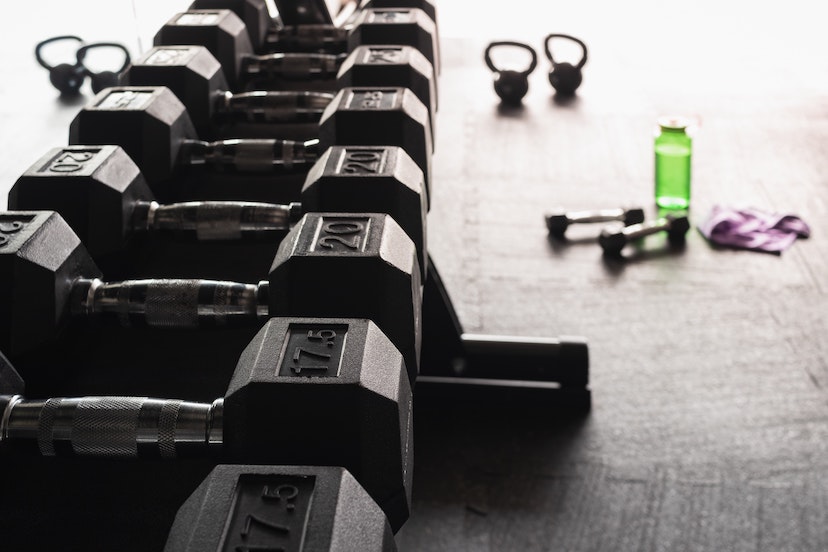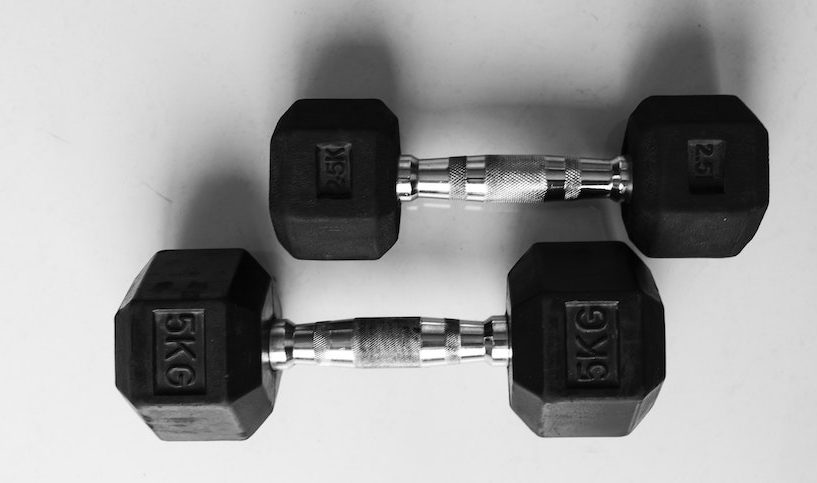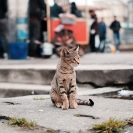With the seaside to his right, a cluster of dusty palms and no-nothing grass to his left, he strides down the Corniche, snorting like some water buffalo, clasping those tiny barbells in both hands, swinging his arms mightily. The cats come out of their rocky seaside houses to stretch and lick themselves, to watch him, and of course he cares nothing for people who must make way for his exercising, not to mention cats that have nothing else to do but watch walkers, joggers and assorted bicyclists. Talking to himself as he strides along the Corniche, but always those tiny barbells. Sometimes he will stop abruptly to take a selfie: him on the Corniche with rocks behind him, him in front of a dusty palm, him with the sea at his back, a flat gray stretching behind him, and so on.
That was the first and second and third time I saw him, moving quickly out of his way as he charged by.
Much later, a Wednesday at the café, and paying no attention to anyone, anything, except the newspaper in front of me, reading about a plague making its way from the north, I suddenly hear a tremendous clatter of utensils behind me that makes no café-eating sense. Half-way through reading about the approaching plague, I wait for the noise to stop, and it does, but not for long, and when I finally turn to see what is what, I immediately spy the two fist-size barbells on the tabletop, and it all begins to make sense. Of course, by now his plate is empty, and nothing like leftovers. As I look for clues of what food could have warranted such a scraping, he sees me even though I was ever so nonchalant—pretending to be intrigued by the blank wall behind him–and with a bit of egg yolk dangling from his upper lip, he asks, “Don’t I know you?”
the plague has arrived, and we all have to do our part to keep it at the windows looking in. But he with the barbells has other thoughts. This time I watch the nametag that says Jamie—who is cook, cleaner, host, who is the only one who answers the telephone that never seems to stop ringing–approach him, asking, “Sir, if you would be so kind as to wear a mask?”
He looks Jamie up and down. “Do you know who I am?”
Today he is facing me and for the first time I can see him fully motionless. He has tiny eyes. I wasn’t prepared for that. His baldness, moustache and hunched shoulders, yes, but not bead-like eyes.
Jamie moves this way and that to get a better look, until, saying. “No, I don’t know.”
And he sighs, as if to say, ‘and therein lies the problem’. “I’m from one of the oldest, most respected civilizations on the planet.” Holding up both hands to show him what a respectable civilization looks like. “One of the oldest, if not the oldest.”
We wait to see if he is joking, as if this is his way of coping with the plague but there is no hint of a smirk, nothing like a grin, and Jamie has no choice but to say, “Yes, well, that certainly is something. Having a history goes a long ways these days, sah?”
He frowns at this. “Are you making fun of me?” His hands flat on the tabletop, alongside his barbells.
“Lah, lah, no, the last thing on my mind, the very last thing.”
“Good, because I don’t like being made fun of.” Meanwhile, I am mildly offended that he does not recognize me; after all, we did have that one minor introduction not too long ago in this very café. How easily he forgets. I continue to watch him, as if, in some way, my staring will force him to remember.

“I am Egyptian, from Cairo, a magical city by anyone’s standards, ask anyone who has been there: dancing fountains, lush parks, a river of people, mysterious alleyways, the orient, not to mention more mummies than you can shake a stick at.” Snorting at his own joke.
All of this from Mr. Barbells is, I must admit, a pleasant surprise, and I can’t help but be impressed. I stare at the two of them.
“Sir, with all due respect to you and your civilization, your city, can you please wear a mask? We have a sign on the door. You have seen it. And so, if you don’t mind.”
“A mask? Like a robber, a bandit? Like that?” And, he takes a cigarette out of his shirt pocket, lights it, blowing smoke between his legs.
“Well, yes and no, but a mask to keep the plague away, if you don’t mind. By the way, we also have a no smoking sign, in fact two of them.”
“You think I have the plague, is that what you’re saying, Me? Of all people, me?”
“Not exactly.”
“By the plague you mean this nonsense that has been going around for the last six weeks. That plague?”
“The very same.”
More cigarette smoke is blown downward, then upward, before he stops to pick a flake of tobacco from his lip, sputtering.
“Sir, a mask if you please. I just so happen to have one right here.”
He, once again, sighs a sigh that could mean: What will they think of next, or Really, or You can’t make me, and so on. This is when he takes the time to take a good look at me, asking, “Don’t I know you?”
“Sort of.”
He nods in consideration.
In the end, having made some kind of point, he puts out his cigarette and grabs the mask that Jamie has not stopped holding out to him. Although he refuses to wear the mask rightfully—more a scarf than a mask–never mind, he must be taken slowly, in small doses.
I will see him one last time, mid-plague, at another café, with friends, same coffee and cakes, but different chairs and tables. The weather was friendly and he had angled himself perfectly, aimed at the cobbled-stoned walkway, giving his friends his shoulder to talk to. He wore a back vest over a white t-shirt, his tiny barbells at his feet. When he did chance to speak to them, giving them his full attention, he offers his ideas on the catastrophe that is Lebanon, not to mention Yemen, “What’s to be done about the Ukraine?” yelling and pounding his chest as if opinions are all about the stuff of noise.
Don’t see Mr. Tiny Barbells much these days, or to be more precise, I’ll almost always hear him before I see him.
Photo by VD Photography on Unsplash.








